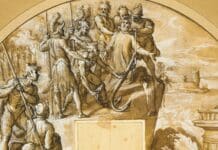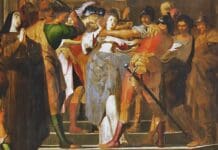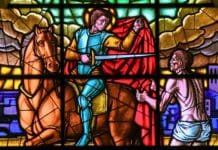 St. John of Kanty is the patron Saint of Teachers, Students, Priests and Pilgrims. John of Kanty was born in the small southern Polish town of Kanty, only thirteen miles from the Pope John Paul II’s birthplace, on June 24, 1390. At the age of 23, he registered for studies at the Jagiellonian University, located in the not too distant city of Krakow—then, the capital of the Polish Kingdom. Founded 1364 by royal decree, it was the same university at which astronomer, Nicolas Copernicus, would study almost 80 years later.
St. John of Kanty is the patron Saint of Teachers, Students, Priests and Pilgrims. John of Kanty was born in the small southern Polish town of Kanty, only thirteen miles from the Pope John Paul II’s birthplace, on June 24, 1390. At the age of 23, he registered for studies at the Jagiellonian University, located in the not too distant city of Krakow—then, the capital of the Polish Kingdom. Founded 1364 by royal decree, it was the same university at which astronomer, Nicolas Copernicus, would study almost 80 years later.
Enrolled in the Department of Liberal Arts, John became a doctor of philosophy in 1418. During the following three years, he undertook further studies in preparation for the priesthood, while supporting himself by conducting philosophy classes at the university.
Immediately following ordination, he accepted a position as rector at the prestigious school of the Canons Regular of the Most Holy Sepulcher in Miechow. That such a school would offer him this position at his relatively young age was evidence of John’s exceptional intellect and talents. It was there in conducting formation classes for the young novices that he became firmly grounded in the writings and spirituality of St. Augustine.
In 1429, a position became vacant in the Philosophy Department at the Jagiellonian University. John quickly returned to Krakow for the Job, taking up residence at the university where he remained until his death. He also began studies in theology and after 13 long years of study intertwined with teaching and administrative duties as head of the Philosophy Department, He finally received his doctorate. Later, after the death of his mentor, the eminent theologian Benedykt Hesse, John assumed directorship of the university’s Theology Department.
As most learned men of his day, John spent many of his free hours hand copying manuscripts of the Holy Scriptures, theological tracts, and other scholarly works. Although only 26 volumes have survived to our time, their total of over 18,000 pages is a testament to his exceptional industriousness.
During the course of his life in Krakow, John became well know among the city’s residents for his generosity and compassion toward the poor, always sacrificing his own needs in order to help those less fortunate. He felt a special affinity toward need students at the university, helping to care for their spiritual, physical, and academic needs, Whether it was in the classroom or in the pulpit, everyone knew him as a staunch defender of the faith and enemy of heretics.
By the time the Master from Kanty died on December 24, 1473, the people of Krakow already considered him a very holy man. That his opinion was wholly justified can be evidenced by the numerous favors and miracles attributed to John’s intercession beginning immediately following his death. Before long, John from Kanty became know widely throughout Europe, drawing pilgrims from many countries to his tomb in the university’s Collegiate Church of St. Anne.
Despite this, the process for his beatification did not begin until 150 years later. Finally, in 1676, Pope Clement XIII declared him a saint of the Roman Catholic Church. (October 20th feast day pre-1970)
Throughout, his many years in Krakow, our philosopher Pontiff , Pope John Paul II drew much inspiration at the grave of his patron saint of learning. It was no surprise, therefore, that during his 1997 pilgrimage to Poland, he once more prayed at the Saint’s tomb. There, during a special gathering with professors from the Jagiellonian-both his and St. John’s alma mater—he alluded to the Master from Kanty when he stated: “Knowledge and wisdom seek a covenant with holiness.”
















